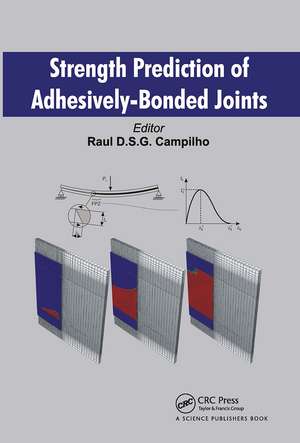Strength Prediction of Adhesively-Bonded Joints
Editat de Raul D. S. G. Campilhoen Limba Engleză Paperback – 31 mar 2021
Preț: 312.43 lei
Preț vechi: 356.63 lei
-12% Nou
Puncte Express: 469
Preț estimativ în valută:
59.78€ • 62.59$ • 49.47£
59.78€ • 62.59$ • 49.47£
Carte tipărită la comandă
Livrare economică 05-19 aprilie
Preluare comenzi: 021 569.72.76
Specificații
ISBN-13: 9780367782412
ISBN-10: 0367782413
Pagini: 422
Dimensiuni: 156 x 234 x 29 mm
Greutate: 0.45 kg
Ediția:1
Editura: CRC Press
Colecția CRC Press
Locul publicării:Boca Raton, United States
ISBN-10: 0367782413
Pagini: 422
Dimensiuni: 156 x 234 x 29 mm
Greutate: 0.45 kg
Ediția:1
Editura: CRC Press
Colecția CRC Press
Locul publicării:Boca Raton, United States
Cuprins
Introduction. Analytical Modelling for the Single-lap Joint. Analytical Modeling for Composite Structures. Analytical Modelling of Dynamic and Impact Loads. Continuum Mechanics Modelling by Finite Elements. Cohesive Zone Modelling for Static Applications. Parameter Identification in Cohesive Zone Modelling. Cohesive Zone Modelling for Fatigue Applications. Damage Mechanics for Static and Fatigue Applications. Extended Finite Element Modelling in Static Applications. Numerical modelling of Bonded Joints and Repairs. Mixed Adhesive Joints for the Aerospace Industry.
Notă biografică
Raul D. S. G. Campilho is affiliated with Instituto Superior de Engenharia do Porto, Portugal.
Descriere
Adhesively-bonded joints provide many advantages over conventional mechanical fasteners and are increasingly receiving attention as an alternative to mechanical joints in engineering applications. The traditional fasteners usually result in the cutting of fibers and hence the introduction of stress concentrations, both of which reduce structural
